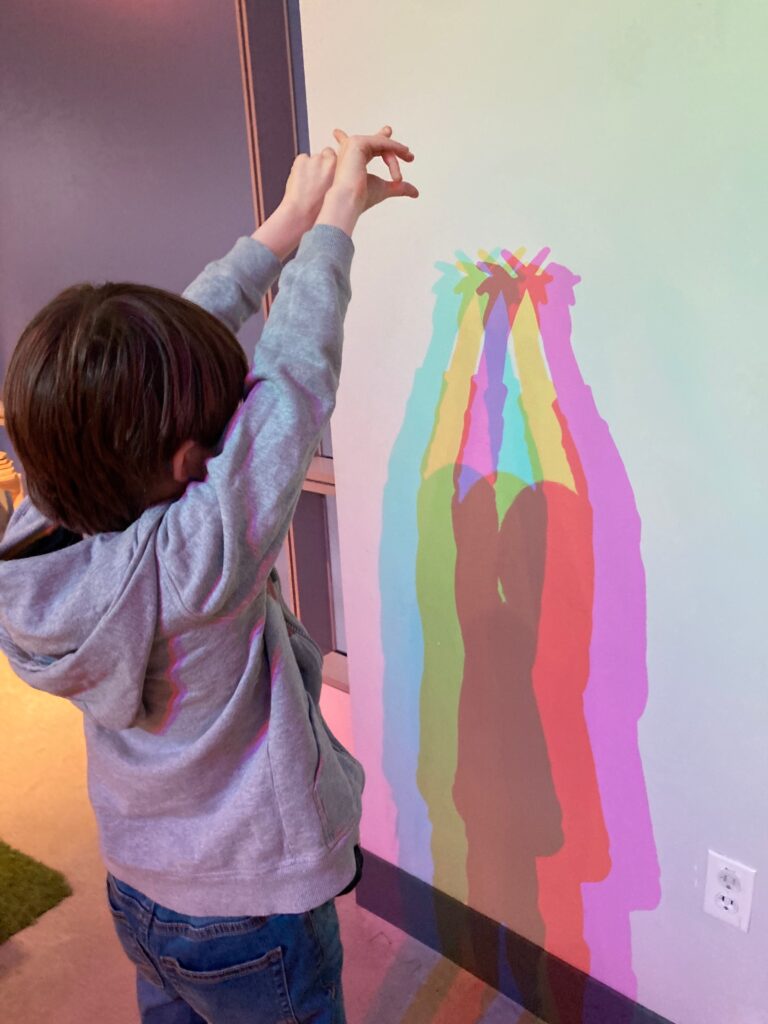
Reading the plaque on the wall at the National Children’s Museum, I raised an eyebrow. I had been looking around while my kids climbed on the huge structure rising up two stories in the middle of the museum. The sign on the wall caught my eye, so of course I read it. It had a little blurb about the skills children would learn from using said giant climbing structure – like problem solving and teamwork – and careers that used those skills. Although I was nodding along at first, I stopped and thought, “Wait a minute! Why are we so worried about them learning specific skills, much less for a career? Why can’t we just let them play?”
In terms of the museum, they had that sign because parents were forking over decent money to bring their kid there and wanted it to be “educational.” But it wasn’t just that museum. It reminded me of the poster at my kids’ play-based preschool, which had a cartoon of kids playing and an onlooker saying, “What are they doing anyway? They’re just playing!” and an explanation of the benefits of play. It sparked a memory of the Montessori saying that “Play is the work of childhood.” I myself have been guilty of talking about “the benefits of outdoor free play” to encourage parents to let their kids play outside without parental leadership.
Needless to say, the sign was a symptom of a much larger societal problem. We won’t just accept play for the sake of play! We find reasons to justify it, to “allow” our kids to do it. To see it in the context of work or self-improvement. It always has to serve some purpose related to what adults want or future productivity.
This kind of attitude deems some forms of play as better than others. It defines “useful” as what’s useful for adults – not kids themselves. It teaches kids’ to value what adults want and need far more than what they want and need. But play for play’s sake is important for kids themselves! As Mona Delahooke, Ph.D. points out in the book Brain-Body Parenting, in play, “children can experiment with concepts, ideas, and emotions outside of real life but in a simulation of their own making.” They can process their own feelings as they need to, without an adult telling them the right and wrong way to do it. Play creates a safe space for kids to be themselves. This process is going to be different for every kid. For some, it will be pretend play with a toy kitchen or stuffed animals. For others, it will be pushing a train around tracks or lining up or categorizing dolls. For some kids, play will be quiet; for others, it will be very loud. If kids are only allowed to play the way adults decide is worthy, many kids (especially autistic kids or those with ADHD) won’t be allowed to play in a way that they want and need to.
This productivity focused attitude also denigrates play in general, making it subservient to and lesser than work. It says that play is only important for what it does for you in the future, not just sheer enjoyment and fun. It teaches kids that they should only care about play if it will be “useful.”
But kids aren’t the only ones that this attitude harms – it hurts adults too. There’s been a lot written lately about the importance of rest and how we’re all burning ourselves out by working too hard. Totally legit and true. While rest is super important and no one gets enough of it, play is important for adults too.
A couple weeks ago, we watched a really charming episode of Bluey. The dad had a couple of his friends over to carry out “Stumpfest,” pulling out stumps from the yard. Bluey asks if she and her friends can use one of the stumps as a nail salon and the dad says yes, as long as they move once the dads are ready to pull it out. Bluey gets upset when the time comes, complaining that her dad is interrupting her play. But then, the mom points out that the dads are playing too, in a way. They’re messing around with their friends, joking and laughing. They’re doing work and playing at the same time. Play helps adults build relationships, work through feelings, and get in a state of flow.
Both us and our kids shouldn’t be focused on optimizing our lives for maximum productivity. Rather, we should focus on balancing helping others meet their needs and meeting our own. Play is one of those needs. It’s integral to our lives – when we don’t have it, we find other ways to fill that gap, like buying stuff or trying to have power over others.
Delahooke describes play as the language of childhood. By stripping our kids and ourselves the joy of play for play’s sake, we’re denying ourselves a whole language and lens through which to understand the world. So make space and time for play – for everyone’s sake.